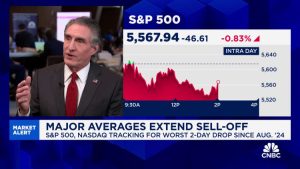Major oil producers on Thursday agreed to continue their existing crude production policy gradually lifting output in January, but also left the door open to make any needed adjustments based on market developments, by keeping the meeting “in session.”
It is an unusual move for the Organization of the Petroleum Exporting Countries and their allies, also known as OPEC+, said Edward Gardner, commodities economist at Capital Economics.
The move “appears to be a way of leaving the door open for a change to output quotas before the next meeting in early January,” he said in a note following the announcement.
In its statement, OPEC+ said it reconfirmed its production adjustment plan and raise monthly overall production by 400,000 barrels per day in January 2022, but it also said that members agreed that the “meeting shall remain in session pending further developments of the pandemic and continue to monitor the market closely and make immediate adjustments if required.”
Stacey Morris, director of research at index provider Alerian, said the statement “gives OPEC+ the flexibility to adjust their plans if market conditions warrant it.”
“The statement reads somewhat like a hedge for their decision — they’re proceeding as planned but have let the door open to adjust their plans as needed,” she told MarketWatch.
““The statement reads somewhat like a hedge for their decision — they’re proceeding as planned but have let the door open to adjust their plans as needed.””
— Stacey Morris, Alerian
OPEC+ also extended its “compensation period” until the end of June 2022. Countries that have produced oil above their quota are required to make up for that overproduction.
“This gives countries that have been ahead of their production quotas, like Iraq, more time to compensate for over production,” said Rebecca Babin, senior energy trader at CIBC Private Wealth US. “This makes sense as many of the countries in OPEC+ have missed production targets and the group as a whole has not met it production increase targets.”
OPEC+ had faced a difficult decision, against a backdrop of the recently discovered omicron variant of the coronavirus that causes COVID-19. The spread of the variant would threaten economic activity and, in turn, demand for oil.
The
undefined
of the variant on Wednesday. That came a day after Moderna’s
MRNA,
Chief Executive Stéphane Bancel told the Financial Times that existing vaccines will likely be less effective against the omicron variant.
Still, while there is “uncertainty in the market around the omicron variant, fundamentals have arguably not changed as much as price action may suggest,” said Morris. The demand impact from omicron is still “unclear.”
At its last meeting in early November, OPEC+ didn’t accelerate plans to gradually lift oil production, as some had expected, given growing signs of tighter inventories. It agreed to raise monthly overall production by 400,000 barrels per day in December, matching the output agreement put in place for November.
Meanwhile, last month the U.S. announced plans to release 50 million barrels of oil from the U.S. Strategic Petroleum Reserve, in coordination with reserve releases from other major oil-consuming nations, in an effort to help reduce retail gasoline prices.
Strategic releases are “not going to have a lasting effect on prices,” said Morris. “The focus now is really on the potential implications for demand from the omicron variant, especially if we start to see increased restrictions.”
Talks with world powers on the Iran nuclear deal were also held last month in what a Russian ambassador described in a tweet as starting “quite successfully.” Most analysts and traders alike don’t expect a deal to revive the 2015 agreement, aimed at restricting Iran’s nuclear program, to be reached soon, but a deal would likely lead to sanctions relief for Iran, allowing the nation to add more oil to global supplies.
The changes in news headlines over the past week have heavily weighed on oil prices, contributing to a nearly 21% November drop in U.S. benchmark West Texas Intermediate prices
CLF22,
CL.1,
following a gain of more than 12% in October. Global benchmark Brent crude
BRNG22,
fell more than 16% last month.
In Thursday dealings, however, oil prices pared early losses, then turned higher following the OPEC+ decision.
January WTI crude was up $1.01, or 1.5%, at $66.58 a barrel on the New York Mercantile Exchange, after trading as low as $62.43. February Brent crude traded at $69.82 a barrel, up 95 cents, or 1.4%.
The OPEC+ move “either shows confidence that global demand is a lot better than the market thinks, or it’s a sign that they did not want to get into a diplomatic situation with the Biden administration,” Phil Flynn, senior market analyst at The Price Futures Group, told MarketWatch.
He believes the agreement to raise production shows that they are “confident” that the omicron variant will “have little lasting impact on demand.”
This post was originally published on Market Watch







